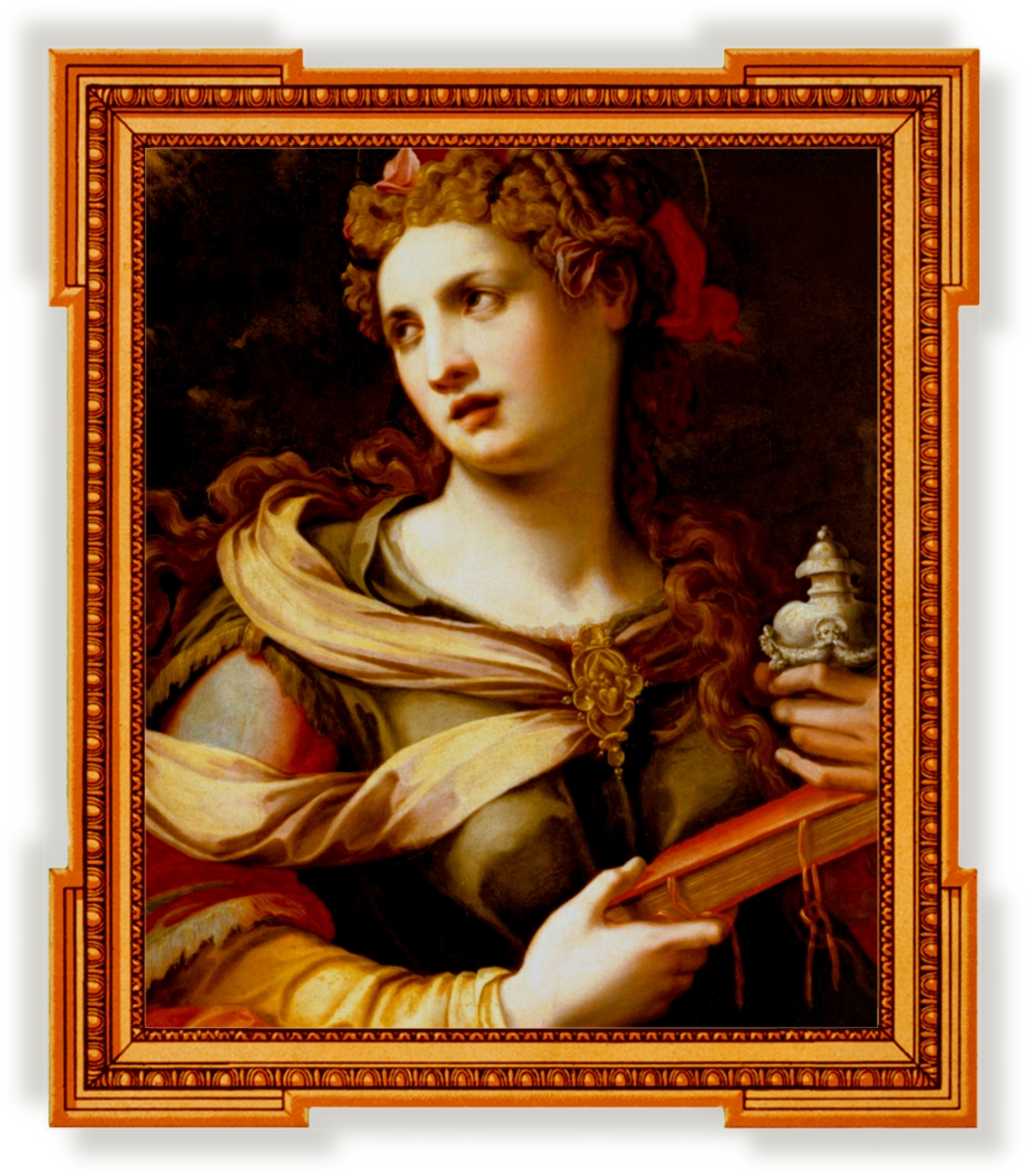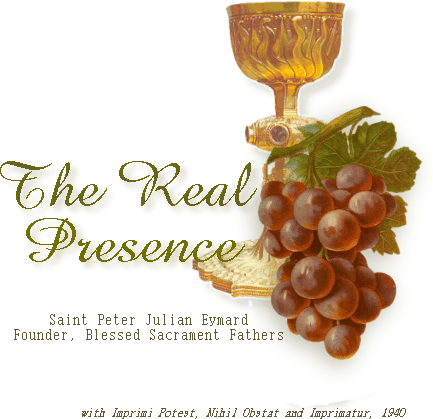

ST. MARY MAGDALEN
Diligebat Jesus . . . Mariam.
Jesus loved . . . Mary. (John xi. 5.)
SAINT MARY MAGDALEN was the privileged friend of Jesus. She served Him with her wealth and accompanied Him everywhere. She honored His humanity magnificently with her gifts. She loved to pray at His feet in the silence of contemplation. For all these reasons she is the patroness and model of a life spent in the adoration and service of Jesus in the Sacrament of His love. Let us study Saint Mary Magdalen; her life is full of the very best lessons.
I
JESUS loved Martha, her sister Mary, and Lazarus; but especially Mary. Certainly He loved the three of them, but He loved Magdalen with a preferential love.
Although our Lord loves us all, He nevertheless has His favorite friends, and He allows us also to have special friends in God. Friends are a natural and even supernatural need. All the Saints had bosom friends, and they themselves were the most affectionate and devoted of friends.
Before her conversion Magdalen was a public sinner. She possessed all the qualities of mind and body and all the gifts of fortune that can lead one to the worst excesses. And she fell into them. The Gospel lowers her to the rank of a public sinner. She was so degraded that Simon the Pharisee felt disgraced when she entered his home. And he even doubted the prophetic power of Jesus because the Master allowed her to remain at His feet.
But after having been forgiven, this poor sinful woman was to take her place among the greatest Saints. See her at work.
II
HUMAN respect is, more than anything else, what holds back great sinners and prevents them from being converted. "I will not be able to persevere," they say. "I dare not start what I cannot finish." And disheartened, they go no further.
But Magdalen learned that Jesus was in Simon's house. She did not hesitate, but went straight to Jesus and made her confession in public. She dared enter a house from which she would have been shamefully expelled had she been recognized at the door. While at the feet of Jesus, she said not a word; her love spoke audibly enough. Artists have painted her with dishevelled hair and disorderly dress; that is all imagination; it would not have been worthy either of Jesus or of her contrition.
She went straight to Jesus without mistaking anyone else for Him. But where had she known Him? Ah! An ailing heart knows well where to find the One that will comfort and cure it!
Mary dared not look upon Jesus. She said nothing: true contrition acts that way. Look at the Prodigal Son and at the Publican. The sinner who looks God full in the face after having offended Him insults Him. But Mary wept: she "washed the feet of Jesus with her tears and wiped them with the hairs of her head." Her place is at the feet of Jesus. These feet trod the earth, and she knew she was but the dust of a corpse. The world is extremely fond of beautiful hair; she used hers as a rag. She remained prostrate on the ground, awaiting her sentence. She heard the remarks made by the envious Apostles and Jews, who honored only triumphant and crowned virtue. They did not like Magdalen who was teaching everyone of them a lesson; for everyone of them had sinned, but not one had the courage to ask pardon publicly. Simon himself, bloated with pride and hypocrisy, grew indignant. But Jesus avenged Magdalen. What beautiful words of rehabilitation: "More has been forgiven her because she has loved more. . . . Thy faith hath made thee safe," said the Savior to her. "Go in peace." He did not add: "Sin no more." Jesus had said this to the adulteress, who was more humiliated for having been caught in the act than repentant for having offended God. But Magdalen had no need of that advice; her love assured Jesus of her firm purpose of amendment. What a beautiful and touching absolution! Magdalen must have had a very perfect contrition! When you go to confession, unite yourself to Magdalen and let your contrition, like hers, proceed more from love than from fear.
Magdalen withdrew after having received this baptism of love. By her humility she became more perfect than the Apostles. Ah! Despise sinners now if you dare! One moment is enough to turn them into great Saints. How many among the greatest has not Jesus Christ drawn from the mire of sin: Saint Paul, Saint Augustine, and many others! Magdalen opens the way for them; she ascended to the very Heart of God because she started very low and knew how to humble herself. Who then has a right to despair?
III
MAGDALEN'S love became active after her conversion. That is an important lesson.
Many converted sinners do nothing else beyond being converted. They want to remain in the peace of a good conscience through fidelity to the Commandments. They dare not follow Jesus, and they end by relapsing into sin. Man cannot live on tears and regrets. You have destroyed the objects to which your heart was so attached and of which you lived; you must substitute something else and live of the life of God. You want to remain at the feet of Jesus? He rises to go; follow Him and walk with Him. And so Magdalen began to follow Jesus; she was never to leave Him. We find her again at His feet, listening to His words and pondering them in her heart. That is the grace of her life. She had no language other than meditation, prayer, and love. She followed Jesus and practiced the virtues proper to His varying conditions of life. A conversion that does not go beyond sentiment is not lasting; Mary shared the different states of Jesus.
During His journeys she procured for Him what He required for His Own subsistence and that of His Apostles. Jesus was frequently to come to the home of His hosts in Bethany; by way of exchange He gave them a food of grace and love. On each occasion Mary sat at His feet and remained there in prayer. Martha became envious of her once, as do all those who think there is only one good state of life, one good way of living. Every state of life is good. The one you have is good; persevere in it, but do not despise the others. When Martha waited on Jesus, she was doing something good; but she was wrong in being envious of her sister.
You know how Jesus answered her and defended Magdalen. It is better to listen to His voice than to wait on Him. It still happens that people engaged in active callings complain of contemplative souls: "You are useless! Come along and work for the salvation of your brethren in charitable undertakings." But Jesus defends them. Must not one also practice charity towards Jesus Christ, Who is so poor and abandoned in His Sacrament?
Magdalen heard that dialogue and her sister's complaints; but she did not answer them. She was at the Savior's feet, and she remained there. Another characteristic trait of Magdalen's active love is suffering; she suffered with Jesus Christ. No doubt she knew beforehand of her Master's death; friends have no secrets for each other. And if Jesus revealed His Passion to His Apostles who were so rude, why would He have concealed it from Magdalen?
See Magdalen in her suffering love. She went where men were afraid to go; she ascended Calvary; she forsook her dearly loved family; she followed the suffering Lord to the very end. And we find her with Mary at the foot of the Cross. The Gospel mentions her by name, and she certainly deserves it. What was she doing there?
She loved and sympathized. A friend wants to share the condition of his friend. Love fuses two lives, two existences into one. Magdalen did not stand; she remembered she had been a sinner, and she remained on her knees. Mary alone stood, immolating her dearly beloved Son, her Isaac.
Magdalen stayed there until after the death of Jesus. She returned on the morning of the first day of the week. She knew very well that Jesus was buried; but she wanted still to suffer and to weep. The Gospel praises the zeal of the other women and the magnificence of their gifts; it speaks only of the tears of Magdalen. She is the Christian heroine. More than all the Saints Magdalen shows us the immensity of Divine mercy.
IV
HOLY WRIT speaks no more of Magdalen after the Ascension. According to a venerable and long-standing tradition the Jews placed Martha, Mary, and Lazarus on a dismasted ship and launched it out upon the high seas to have them
meet with certain death. But the Friend of former days still loved them. Jesus became their Pilot and Helmsman. He led them to Marseilles and gave them to the French, His friends and the eldest of His family.
Lazarus died a Martyr. The beautiful land of Provence had to be watered with his blood before the faith could blossom there. Martha went up as far as Tarascon and, gathering a community of virgins about her, performed spiritual and corporal works of charity throughout the surrounding country.
Magdalen withdrew upon a mountain as though to draw nearer to God. There she found a grotto, which without doubt had been prepared by angelic hands. But she soon had too many visitors; and not having enough time to converse with her good Master, she went up higher to a rugged peak and there communed with God alone. There she spent the last days of her life. She prayed, and she continued in her own life the mysteries of Jesus Christ. Jesus was constantly visiting her. Priests brought her Holy Communion. And when she was at the point of death, Saint Maximinus, one of the seventy-two disciples of our Savior, gave her Communion with his own hand. She had accompanied Jesus at His death; this good Savior rendered her the same service and the same honor.
She died in France and we are proud of it. We possess her holy relics. That is one of the strongest proofs of the love Jesus Christ has for France. He sent us His friends; they are in our midst. Let us hope Magdalen's prayers and merits will entitle France to God's mercy, provided it imitates her repentance and her love of Jesus Christ, Who lives in France and dwells in its towns and most obscure hamlets. Yes, Jesus Christ loves France as He loved Magdalen and the family of Bethany, with a love of predilection.
 Contact Us
Contact Us
HOME---------------THE HOLY EUCHARIST DIRECTORY-----------------------BLESSED SACRAMENT VISITS
www.catholictradition.org/Eucharist/real-presence47.htm